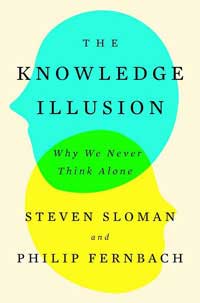 304 pages
304 pages9 CE credits
Course Enrollment
$210.00
Add to Cart
All exams are taken online. The exam for this course will be available in "My Courses" immediately upon enrollment. Note the book is not included.
The book is available for purchase from Amazon.
As an Amazon Associate we receive a rebate from qualifying purchases.
THE KNOWLEDGE ILLUSION
Why We Never Think Alone
Steven Sloman and Philip FernbachRiverhead Books, 2017
DESCRIPTION
Humans have built hugely complex societies and technologies, but most of us don't even know how a pen or a toilet works. How have we achieved so much despite understanding so little? Cognitive scientists Steven Sloman and Philip Fernbach argue that we survive and thrive despite our mental shortcomings because we live in a rich community of knowledge. The key to our intelligence lies in the people and things around us. We're constantly drawing on information and expertise stored outside our heads: in our bodies, our environment, our possessions, and the community with which we interact–and usually we don't even realize we're doing it.
The human mind is both brilliant and pathetic. We have mastered fire, created democratic institutions, stood on the moon, and sequenced our genome. And yet each of us is error prone, sometimes irrational, and often ignorant. The fundamentally communal nature of intelligence and knowledge explains why we often assume we know more than we really do, why political opinions and false beliefs are so hard to change, and why individual-oriented approaches to education and management frequently fail. But our collaborative minds also enable us to do amazing things. The Knowledge Illusion contends that true genius can be found in the ways we create intelligence using the community around us.
The reader will be able to:
• Apply cognitive psychology perspectives to examining ignorance especially in the world we perceive
• Explain the illusion of understanding, that we do not understand much about the world
• Posit that we do not understand what we do not understand and how cognitive psychology can help us over these conundrums
• Describe what is referred to as the community of knowledge, and explain how we rely on others' understanding
• Define the elements of the hive mind's bringing about a communal understanding which is greater than individual understanding
AUTHOR
Steven Sloman, a professor at Brown University, is a computationally oriented cognitive scientist who studies how people think. He is currently Editor-in-Chief of the journal Cognition. His previous book is Causal Models: How We Think About the World and Its Alternatives. Philip Fernbach is an assistant professor of marketing at the University of Colorado, Boulder, who studies how people think and make decisions.
EDITORIAL REVIEWS"Much of the discussion is compelling, and this book could well change the way you read . . . Still, his writing is entertaining and he's tapping into a rich vein, and I hope he will explore the subject further."
--New Scientist
ISHK CE at Home
1702-L Meridian Ave., #266
San Jose, CA 95125-5586
This website uses cookies to ensure you get the best experience on our website. Learn more
